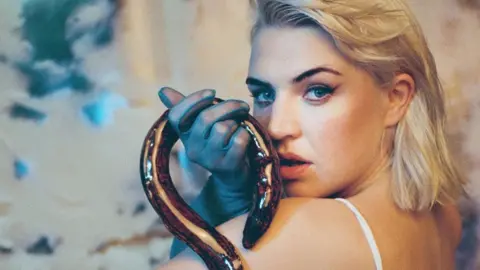Self Esteem is better off on her own
 BBC
BBCPop history, like all history, is written by the winners.
So imagine what it's like being stuck in a moderately successful indie band in an era of Ed Sheeran and Drake and Adele.
While they're off winning awards and selling out stadiums, you're being dragged out on long, dreary tours, punctuated by soggy service station sandwiches and cheap hotels.
And that's before you consider the musical compromises everyone has to make in a band - where your colleagues curtail your creativity as often as they elevate it.
This was Rebecca Lucy Taylor's life as one half of Slow Club - whose dreamy country-soul was popular enough to trouble the Top 75 and festival line-ups, but never enough to compensate for the personal, musical and financial sacrifices.
Taylor's growing frustration was captured in the documentary Our Most Brilliant Friends, which chronicled the growing distance between the musician and her bandmate Charles Watson on Slow Club's final tour in the winter of 2016.
"It was so hard towards the end," she tells the BBC. "We were still sharing Travelodge rooms and that wasn't good for my head.
"There's no HR in music. No-one cares about your wellbeing. So if I needed time alone, or I didn't want to change in the toilets in the venues, I was made to feel like that was maybe me being a diva or me being a handful.
"I thought I was going mad, but it was just about quality of life."
 Getty Images
Getty ImagesWatching the film, you can see the end coming. There's no big climactic argument or falling out... it just becomes achingly apparent that everyone's unhappy, and someone needs to pull the plug.
When the split finally came in 2017, Taylor set off for Margate to record the music she'd wanted to make all along: Meaty, defiant, cutting-edge pop.
"With Slow Club, I knew what worked on stage," she says, "and I'm quite lazy, so I didn't want to waste time doing something else.
"But something happened a few years ago. I was just too tired of trying to please everyone.
"So it's like I've unbuttoned the top of my trousers and gone, 'aaahhhh,' after a big curry. I'm doing exactly what I want. I've created a monster!"
The monster was christened Self Esteem - a name Taylor originally gave to an Instagram account full of spiky observations about modern life ("I need you to know that I hate what you've done to me, but you won't accept my Facebook friend request," reads one).
But Self Esteem is also a perfect "nom de pop", reflecting both Taylor's finely-tuned neuroses and the mental health-boost she got from going solo.
"There's a weird type of confidence that I've never had before, where I'm like 'if you want to slag this music off, that's ok because I know I'm happy,'" she says.
Allow Google YouTube content?
Her debut album, Compliments Please, drops the don't-mind-us modesty of Slow Club in favour of a more vivacious, experimental sound.
Inspired by Destiny's Child, Kanye West, Rihanna and "that amazing record by Nicola from Girls Aloud" [2011's Cinderella's Eyes], it wears the guise of a pop album, but messes with the formula to produce something much more unpredictable.
"As much as I love them, I feel too old to sound like Little Mix," says Taylor. "So I like to be really direct and commercial, then skew it a little bit.
"There's a version of this record I could have done that's all tits and arse and hair and make-up, but I never felt comfortable being a bombshell.
"We've done photoshoots like that, but then I'll have a runny nose in the picture. There's always just one thing that's slightly uncomfortable."
The result is a record that's shot through with drama, from the sudden, piercing choir that punctuates I'm Shy, to the furious In Time, where an auto-tuned Taylor tells her lover she's "patiently seething, hoping that you leave".

Girl Crush, meanwhile, finds her untangling the mess of a drunken lesbian fling.
"I'm not a holiday," she scolds a would-be suitor, in a lyric that's borne of experience.
"I'm bisexual and I'm quite feminine but I'm also quite tall, so I've always found that drunk straight girls gravitate towards me in a club or a party or whatever.
"For years, because I was attracted to them, I'd go along with it. But then I'd be like, 'There's nothing in this for me.' I'm just a good story for people."
The song is intended as an antidote to tracks like Rita Ora's Girls or Katy Perry's I Kissed A Girl - both of which attracted criticism for misrepresenting same-sex attraction as a drunken dalliance or a childish dare.
"I mean, I love Katy Perry, but I Kissed A Girl is everything that's wrong with everything, and it set people like me back a lot," says Taylor.
"So I just wanted to do an anti-I Kissed A Girl song. Just so people know it's not very fun for the queer girl in this situation. It's a bi-bop, we call it. There's not enough of them."
Allow Google YouTube content?
Elsewhere, the album addresses how Taylor swallowed her ambitions in the service of Slow Club.
"What I might have achieved / If I wasn't trying to please," she sings on Rollout, over a strutting bassline and what appears to be an air-raid klaxon.
"Trying to please - I mean, that's the story of my whole 20s," she says.
"That goes for my band, but also my romantic relationships, my family relationships, even society, I guess."
Almost inevitably, doing whatever the hell she wants has granted Taylor some of the best reviews of her career - but it's not something she saw coming.
"I was worried I would alienate everyone and that's definitely not happened," she says.
"The biggest shift has been that the people in the crowd now are people I could have a laugh with.
"I always had this little inkling that there were other people out there like me."
Self Esteem plays Glastonbury and Latitude this summer, before touring the UK in October.

Follow us on Facebook, on Twitter @BBCNewsEnts, or on Instagram at bbcnewsents. If you have a story suggestion email [email protected].
